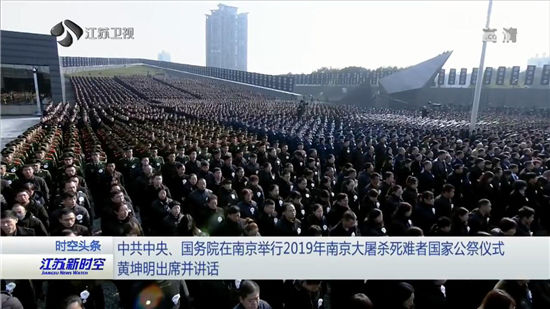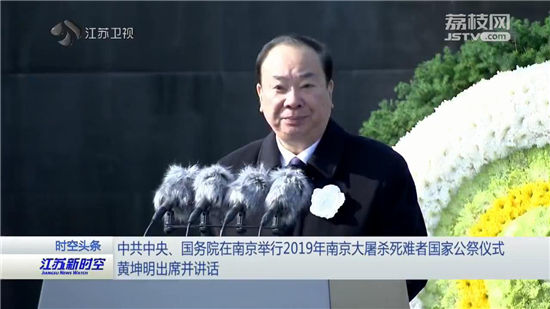The memorial ceremony for the National Memorial Day for Nanjing Massacre Victims was held Friday at the memorial hall for the massacre victims in Nanjing, Jiangsu province, where sirens commemorate history, future of peaceful development planned.
On Dec 13, 1937, a piercing air raid siren echoed through Nanjing to warn people of the Japanese army's capture of the city. Eighty-two years later, the same sound blared across the city once again to express people's grief over the Nanjing Massacre's victims.


Shortly after 10 am, people stood still and bowed their heads to pay silent tribute to the victims as the one-minute siren howled over Nanjing. Cars, trains and ships sounded horns at the same time.

The Memorial Hall of the Victims of the Nanjing Massacre by Japanese Invaders held a ceremony on Friday morning. People rang the peace bell at the hall, laid wreaths in front of the wall inscribed with the names of the victims and set pigeons free to call for peace.
Huang Kunming, a member of the Political Bureau of the Communist Party of China Central Committee and head of the Publicity Department of the CPC Central Committee, gave a brief speech to commemorate the victims and cherish peace.
"Today we held the national memorial ceremony to review the history of the Chinese People's War of Resistance Against Japanese Aggression to commemorate Nanjing Massacre victims and commemorate all the compatriots killed by the Japanese aggressors-the martyrs and national heroes who gave their lives for victory in the war of resistance-and to remember the international friends who gave their lives to join hands with the Chinese people to fight against the Japanese aggressors."
Huang said that China will remember history, cherish peace and pursue peaceful development.
During the occupation of Nanjing, the Japanese army committed numerous atrocities, such as rape, looting, arson, and the execution of prisoners of war and civilians. Although the executions began under the pretext of eliminating Chinese soldiers disguised as civilians, a large number of innocent men were intentionally identified as enemy combatants and executed—or simply killed outright—as the massacre gathered momentum. A large number of women and children were also killed, as rape and murder became more widespread.
Chang Zhiqiang, a 91-year-old survivor, said the tragedy was unforgettable because it was like "a sharp knife that stabbed in the heart".
The man, then 9, saw his father and four little brothers shot and stabbed by Japanese soldiers, his only sister raped and killed and his mother stabbed to death. The mother was breastfeeding his two-year-old brother in the last moments of her life, and blood flowed from her chest wound.
"I have rarely mentioned the experience to others during my lifetime," he said. "But as I grow older, I feel the responsibility to give testimony and live longer to serve as an eyewitness."
After the memorial hall reopened its renovated historical facts exhibition in 2017, it had received over 15 million visitors by November 2019.
Some 300,000 people have left messages in the guest book at the hall. The 2019 guest book weighs 792 kilograms. Visitors from more than 60 countries have visited, according to the memorial hall.
In 2014, China's top legislature designated Dec 13 as the National Memorial Day for Nanjing Massacre Victims. The hall conducted its first memorial day ceremony that year.
(Source:ourjiangsu.com)






